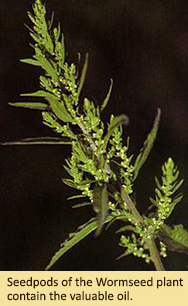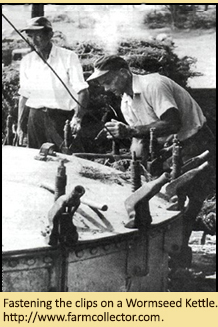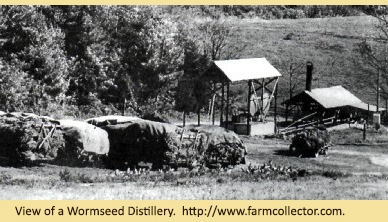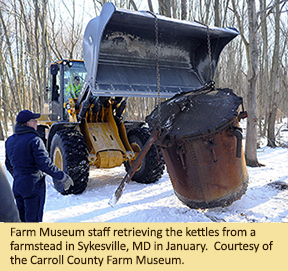Curator's Choice 2014
Maryland's Oil Fields
July 2014
By Nichole Doub, MAC Lab Head Conservator
 From 1840 through the 1960s, Carroll County was the world’s leading producer of Wormseed Oil, an uncommon product today but a vital one at the turn of the century. Wormseed Oil was a popular vermifuge, a deworming treatment for livestock as well as humans until the modern pharmaceutical industry developed synthetic drugs and other treatments in its place. The
From 1840 through the 1960s, Carroll County was the world’s leading producer of Wormseed Oil, an uncommon product today but a vital one at the turn of the century. Wormseed Oil was a popular vermifuge, a deworming treatment for livestock as well as humans until the modern pharmaceutical industry developed synthetic drugs and other treatments in its place. The  Rockefeller Foundation was an important influence in pressing for its use in the treatment of hookworm (Graybeal 2000). During the height of production, more than 1500 acres across the county were dedicated to the cultivation of Wormseed (Chenopodium ambrosioides), an annual plant that grows between 3 and 4 feet tall and prefers loamy soils. When the plant is mature, it is cut and left to dry in the fields, and then gathered in the early morning when the dew protects the delicate seedpods from shattering (Teunis 2001).
Rockefeller Foundation was an important influence in pressing for its use in the treatment of hookworm (Graybeal 2000). During the height of production, more than 1500 acres across the county were dedicated to the cultivation of Wormseed (Chenopodium ambrosioides), an annual plant that grows between 3 and 4 feet tall and prefers loamy soils. When the plant is mature, it is cut and left to dry in the fields, and then gathered in the early morning when the dew protects the delicate seedpods from shattering (Teunis 2001).
The plants are then packed into large iron kettles for steam distillation, which extracts the precious oil. A boiler discharges steam into the kettle and in turn the volatile oil is released from the plant and mixes together with the water vapor. It then passes through a condenser and the liquid oil and water gather in a trough where the water is removed by allowing the oil to rise to  the top and the water drained off. This liquid is often distilled a second time, which will produce a heavier oil of higher grade(Teunic 2001). Specific gravity was the primary means of determining the quality of the product. This 10 hour process could produce up to 100 pounds of wormseed oil. At its most profitable, 1 pound of oil could fetch as much as $11.50 (Warner 1976)!!!
the top and the water drained off. This liquid is often distilled a second time, which will produce a heavier oil of higher grade(Teunic 2001). Specific gravity was the primary means of determining the quality of the product. This 10 hour process could produce up to 100 pounds of wormseed oil. At its most profitable, 1 pound of oil could fetch as much as $11.50 (Warner 1976)!!!
During the Prohibition Era, visitors to Carroll County were shocked at the flagrant display of distillation, not realizing the product in question was not alcohol, though perhaps some residents exploited the situation (Democratic Advocate 1929).
 Two of these wormseed kettles were recently acquired by the Carroll County Farm Museum with the intention to create an educational display commemorating this unique period of the county’s agricultural history. The Museum is also interviewing the local families who owned and worked on wormseed farm and still sites to preserve the living historical record (John Sies and Mark Duvall, personal communication, March 5, 2014 and March 27, 2014). The Maryland Archaeological Conservation Laboratory is collaborating on this project, providing conservation advice, and advocacy for the realization of the exhibit. For additional information on the progress of the Farm Museum’s wormseed project and their many events and activities, visit their website at www.carrollcountyfarmmuseum.org.
Two of these wormseed kettles were recently acquired by the Carroll County Farm Museum with the intention to create an educational display commemorating this unique period of the county’s agricultural history. The Museum is also interviewing the local families who owned and worked on wormseed farm and still sites to preserve the living historical record (John Sies and Mark Duvall, personal communication, March 5, 2014 and March 27, 2014). The Maryland Archaeological Conservation Laboratory is collaborating on this project, providing conservation advice, and advocacy for the realization of the exhibit. For additional information on the progress of the Farm Museum’s wormseed project and their many events and activities, visit their website at www.carrollcountyfarmmuseum.org.
"Autoists have come back with wild stories of stills in public places around Eldersburg, but they are stills for the production of the only known cure for hookworm." (Democratic Advocate 1929).
| References |
|
| Graybeal, Jay A. |
| 2000 |
Carroll Lead World in Wormseed Oil Production, Carroll County Times, accessed March 6, 2014. |
|
| Sandoval, Timothy |
| 2014 |
Farm Museum Aims to Erect Wormseed Oil Exhibit, Carroll County Times, accessed March 6, 2014. |
|
| Teunis, Jill |
| 2001 |
Boiling Oil. Farm Collector. Web resource http://www.farmcollector.com/tractors/boiling-oil.aspx#axzz35YuKrbOa accessed June 18, 2014. |
|
| Warner, Nancy B., et al. |
| 1976 |
Carroll County, Maryland: A History 1837-1976. Carroll County Bicentennial Committee. p.168-169. |
|
| Democratic Advocate |
| 1929 |
Democratic Advocate, November 27, 1929, accessed June 19, 2014. |
|